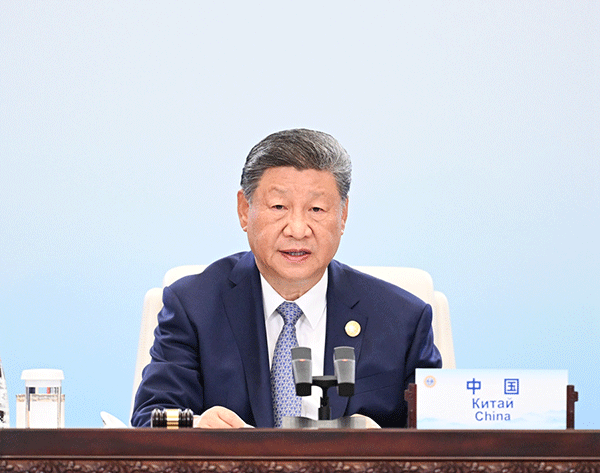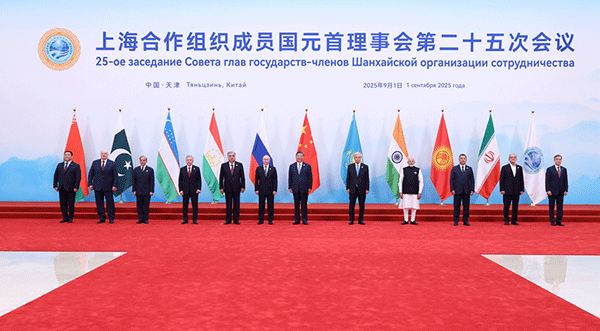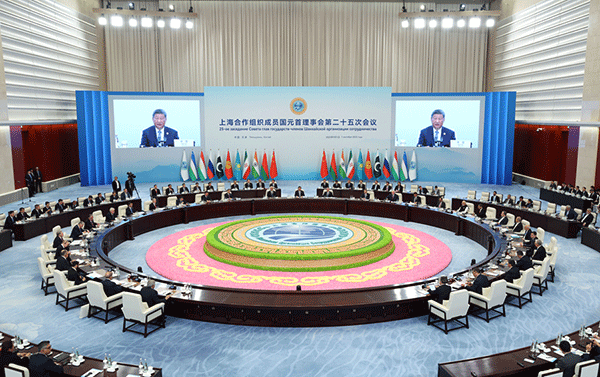
People’s Republic of China


On the morning of September 1, 2025, the 25th Meeting of the Council of Heads of State of the Shanghai Cooperation Organization (SCO) was held at the Tianjin Meijiang Convention and Exhibition Center. President Xi Jinping presided over the meeting and delivered an important statement titled “Staying True to SCO Founding Mission and Ushering in a Better Future.”
On this clear autumn day, the air was crisp and refreshing. Outside the Meijiang Convention and Exhibition Center, the national flags of participating countries and the flag of the SCO fluttered in the wind. The logo of the SCO’s 2024–2025 presidency stood out prominently.

President Xi warmly shook hands with the leaders of the SCO member states and heads of its permanent bodies, posed for a group photo with them, and then presided over the Council of Heads of State meeting.
President Xi recalled the extraordinary journey of the SCO’s development, from its early days by the Huangpu River to the present meeting on the banks of the Haihe River. Over the past 24 years, guided by the Shanghai Spirit of mutual trust, mutual benefit, equality, consultation, respect for diversity of civilizations, and pursuit of common development, the member states have shared opportunities, sought common development, and brought about groundbreaking and historic achievements. The SCO has established itself as a model for a new type of international relations. The SCO was the first to set up a military confidence-building mechanism in its member states’ border areas and the first to take multilateral actions against the three forces of terrorism, separatism and extremism, thereby maintaining peace and tranquility in the region. The SCO was the first to launch Belt and Road cooperation, providing robust driving force for development and prosperity and further improving the multidimensional connectivity network across the region. The SCO was the first to conclude a treaty on long-term good-neighborliness, friendship and cooperation, and proclaim the member states’ commitment to forge lasting friendship and refrain from hostilities, bringing the hearts of the peoples closer to each other. The SCO was the first to put forth a vision of global governance featuring extensive consultation and joint contribution for shared benefit as an effort to practice true multilateralism, thus becoming a proactive force for world peace and development.

President Xi emphasized that the SCO has grown into the world’s largest regional organization, and its international influence and appeal are increasing day by day. Looking ahead, the member states should carry forward the Shanghai Spirit, forge ahead with solid steps, and better tap into the potential of the SCO.
First, seeking common ground while putting aside differences. SCO member states should respect their differences, maintain strategic communication, build up consensus, and strengthen solidarity and collaboration. They should make the pie of cooperation bigger, and fully utilize the endowment of each country, so as to fulfill their responsibility for peace, stability, development, and prosperity in the region.
Second, pursuing mutual benefit and win-win results. SCO member states need to better align their development strategies and promote the high-quality implementation of the Belt and Road Initiative, improve trade and investment facilitation, enhance cooperation in such areas as energy, infrastructure, green industry, the digital economy, scientific and technological innovation, and artificial intelligence, so as to march toward modernization hand in hand by bringing out the best in one another and working together for a shared future.
Third, championing openness and inclusiveness. SCO member states need to enhance mutual understanding and friendship through people-to-people exchanges, firmly support one another in economic cooperation, and jointly cultivate a garden of civilizations in which all cultures flourish in prosperity and harmony through mutual enlightenment.
Fourth, upholding fairness and justice. SCO member states must promote a correct historical perspective on World War II, oppose the Cold War mentality, bloc confrontation and bullying practices, safeguard the U.N.-centered international system, support the multilateral trading system with the WTO at its core, and make the global governance system more just and equitable.
Fifth, striving for real results and high efficiency. SCO member states should continuously promote the reform of the Organization, increase resources input and enhance capacity building to improve its institutional structure and make its decision-making more scientific and its actions more efficient, and provide stronger underpinnings for security and economic cooperation among them.
President Xi noted that China always aligns its development with that of the SCO and with the aspiration of the people of member states for a better life. China will work with all parties to stay true to the SCO’s founding mission, step up to undertake their duties, promote the sound and sustained development of the SCO, and march steadily toward a brighter tomorrow of a community with a shared future for humanity. (For full text of the statement, see: https://www.fmprc.gov.cn/eng/xw/zyxw/202509/t20250901_11699345.html.)
Belarusian President Alexander Lukashenko, Indian Prime Minister Narendra Modi, Iranian President Masoud Pezeshkian, Kazakh President Kassym-Jomart Tokayev, Kyrgyz President Sadyr Japarov, Pakistani Prime Minister Shehbaz Sharif, Russian President Vladimir Putin, Tajik President Emomali Rahmon, Uzbek President Shavkat Mirziyoyev, SCO Secretary General Nurlan Yermekbayev, and Director of the Executive Committee of the Regional Anti-Terrorist Structure Ularbek Sharsheev delivered statements. They highly commended China’s contribution to the development of the SCO and its effective work during its presidency, spoke positively of the SCO’s achievements, and offered proposals for its future cooperation. The parties all agreed that working with China on the Belt and Road Initiative has enabled countries to share new opportunities from China’s development. The three major global initiatives proposed by China have brought certainty and stability to a turbulent world. All parties agreed to continue upholding the Shanghai Spirit, build consensus, unite together, move forward hand in hand, strengthen cooperation in the fields of politics, security, economy and trade, science and technology, and culture, coordinate responses to both traditional and nontraditional security threats, resolutely combat the three forces of terrorism, separatism and extremism, and promote the SCO’s higher-quality development through higher-standard cooperation, thereby making greater contributions to regional and global stability and prosperity. All parties share the view that amid the fluid and turbulent international landscape, SCO member states should strengthen strategic coordination, safeguard the victorious outcomes of World War II, uphold the purposes and principles of the U.N. Charter, oppose unilateralism, hegemonism, and protectionism, improve the global governance system, and safeguard international fairness and justice. The victory of the Chinese People’s War of Resistance Against Japanese Aggression is a major contribution by China to world peace. It reflects the courage, perseverance, and resilience of the Chinese people, and deserves to be remembered forever.
The leaders of the member states signed and issued the Tianjin Declaration of the Council of Heads of State of the Shanghai Cooperation Organization, approved the SCO Development Strategy to 2035, released a statement on the victory of World War II and the 80th anniversary of the founding of the United Nations, a statement on supporting the multilateral trading system, and adopted 24 outcome documents covering enhanced cooperation in security, economy, people-to-people ties, and organizational development.
The leaders of the member states jointly witnessed the inauguration of four new centers: the SCO Universal Center for Countering Security Challenges and Threats, the Center for Combating Transnational Organized Crime, the Information Security Center, and the Anti-Drug Center.
The meeting approved the admission of Laos as a dialogue partner and decided that Kyrgyzstan will assume the SCO presidency for 2025–2026.
Cai Qi and Wang Yi, among others, were present at the meeting.



